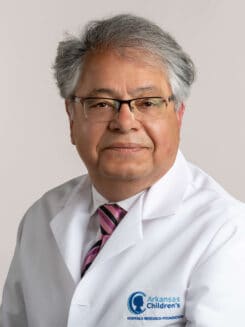Reza Hakkak, Ph.D., a professor in the UAMS College of Health Professions Department of Dietetics and Nutrition, the associate dean for research in the College of Health Professions, and a professor of pediatrics in the College of Medicine, has contributed greatly to research on the effects of diets on diseases prevention and obesity and breast cancer and is known nationally and internationally for his discoveries and his expertise in these areas.
For over 30 years, he contributed greatly to research on the effects of diet on disease prevention, especially cancer, and has seen research efforts expand and thrive across UAMS. In 1987, he was a postdoctoral fellow in the UAMS College of Medicine Department of Internal Medicine Division of Endocrinology, investigating the effects of glucocorticoids on human cancer cell lines. In 1987, the Arkansas Cancer Research Center was established, and he became a member and is still serving on several committees. In 1990, he joined the Department of Pediatrics to study the effects of several dietary proteins on breast and colon cancer development. This work put him among the first researchers of the Arkansas Children’s Research Institute, which opened at Arkansas Children’s Hospital in 1992 and was integral to U.S. Department of Agriculture Agricultural Research Service funding for the Arkansas Children’s Nutrition Center in 1995.
From his publication in the year 2000 where he showed that the specific protein in diets can reduce breast and colon cancer, he started a new idea among cancer researchers to investigate the role of diet in cancer prevention in more depth. His initial research article on diet and cancer prevention received national and international attention among cancer researchers and is considered one of the classical papers in this field. For the past 28 years, he has been awarded several grants as principal or co-principal investigator.
His research has explored nutrition and energy balance, primarily through rodent models. By studying lean and obese Zucker rats in work funded by the Susan G. Komen Breast Cancer Foundation, he has examined the influence of obesity on the development of mammary tumors, as well as on intermediate markers of risk, such as serum adiponectin and insulin-like growth factors. His discovery that obesity promotes carcinogen-induced mammary tumors in rats was a landmark paper published in the journal Breast Cancer Research, and his work in rodents has served as a basis for investigations in humans.
He was one of the first to recognize the link between obesity and breast cancer, which opened up an entirely new area of research. He made a compelling discovery linking the effects of obesity and soy isoflavone ingestion to the risk of breast cancer development. This observation goes against the current dogma regarding soy ingestion and breast cancer risk as it strongly suggests that obesity increases rather than decreases the risk of developing breast cancer with long-term ingestion of soy isoflavones. His surprising finding has global implications with regard to nutrition and cancer risk, especially given the worldwide increase in the ingestion of soy-containing products. Lately, his work on obesity and soy on liver steatosis has been recognized by different researchers. His lab is among one of the first to report the link between obesity and gut microbiota. In 2019, he was awarded a USDA grant to investigate the role of the gut microbiota on liver steatosis protection by low and high isoflavones soy protein diets.
In addition to his scholarly work on obesity and cancer and his peer-reviewed publications on this topic, he has also applied his expertise in obesity to public health efforts, studying human obesity and its effects on human health, including children in a Head Start program. Thus, his highly creative work transitions from the discoveries in the laboratory using rodent models to application to human populations, in research projects as well as in application for public health. His work has had an impact not only in moving the science in obesity research in the laboratory but also in human health.
He has published 70 articles and 250 abstracts and presentations at national and international meetings. He serves on the editorial boards of several journals. In 2016, he founded the Journal of Obesity and Chronic Diseases, and he serves on the editorial boards of multiple professional journals.

